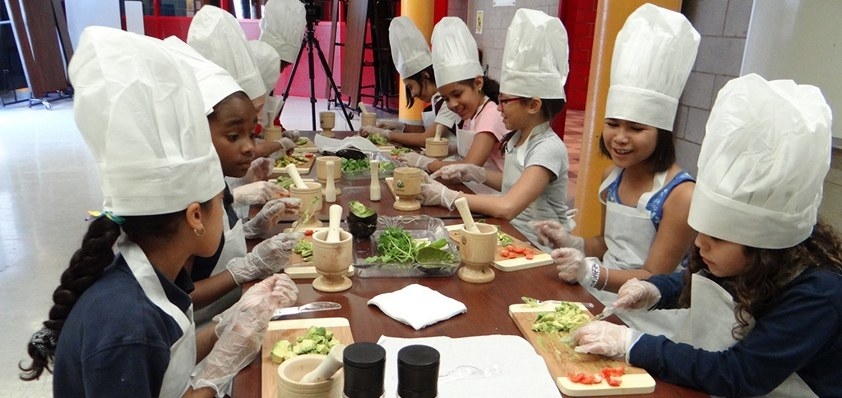The numerous problems associated with the increased level of obesity in children and adolescents made us realize that food education in school is of great importance. Teachers cannot limit their responsibilities to exposing the students to knowledge about curriculum subjects, and teach them things necessary for living a good life as well. They should not think that parents are guaranteed to do it themselves.
Now we have various programs and initiatives aimed at creating a food literate society by teaching children about food, where it comes from, how it affects their bodies, how they can grow and cook food themselves, etc. That is a big shift in the perception of how school education should look like.

However, there is one thing about it, which still has not been given enough attention. While teaching kids about the importance of balancing carbs, protein, fat and consuming foods rich in vitamins and minerals, we also need to discuss with them a variety of existing dietary practices that can cause serious damage to health. It is more obvious if we consider the fact that inappropriate nutrition is far more dangerous for kids as they continue to grow.
Teens usually fall for new trends and tendencies without investigating them much. Unfortunately, as they progress through school, they get less food education, which is wrong since adolescence is just the time when people begin to look for themselves and make experiments including those with nutrition.
Why experiments with nutrition can be dangerous
Some people do not often accept the fact they have chosen the wrong path until it is too late. For instance, there are people who fanatically stick to raw food diet, veganism or vegetarianism, and despite visible health problems, keep on ruining their organism. These diets can be a good choice for some people (not all people, as often declared).
However, their strict forms that suggest, for example, eating only fruits or vegetables cannot be healthy by default. So, why do many people, including teens, keep on following them? One of the reasons is that some online communities dedicated to diets have turned to a sort of a cult that is known for creating psychological addiction in its followers and narrowing their perception. The latter then become more and more obsessed with restricting themselves from food that is inappropriate in their opinion.

Why teens are at risk
It is clear that messages popularized by communities’ leaders and members are in tune with teens’ psychology: they can easily fall for statements that followers of a particular diet are superior to others by being independent from “food drugs” or doing no harm to living creatures. (It is usually the ones that prohibit the consumption of meat, fish and/or by-products of animal slaughter).
In addition, besides great health, mental clarity, healing serious diseases, achieving some sort of enlightenment, kids are promised to become “one of the tribe” to fulfill their need to be a part of a community.
Why educating teens about generally accepted standards of healthy nutrition is not enough
Followers of dietary practices usually use arguments that contradict ideas about human organism functioning from the perspective of a modern science and argument their opinion by providing stories of magical healing from various terminal illnesses thanks to switching to a particular diet when so called official medicine failed.
They can ignore or twist the facts, claiming them being false or obsolete. That means teens have to be taught in schools how to distinguish opinions of professionals from groundless hypothetical exercise. It is important, because modern teens absorb social media news without considering the source. They can perceive posts filled with made-up facts, bogus science and useless advice as credible sources of information.
It is easier to prove them that eating chips and drinking soda does not lead to anything good, but the task gets more difficult when you try to convince kids that eating only healthy food as they see it can also be bad for them. Many people feel euphoric when they are on a diet for the first months and then explain problems with health as natural process of “cleaning up”.
Therefore, in order to prevent kids from turning into plants-eating zombies, schools need to teach them how they can get all the necessary nutrients and vitamins while abstaining from the consumption of certain food.

Kids need to have a possibility to discuss existing points of view on nutrition and to be warned about possible consequences of their choices. There are several articles, like this one and this one, for example, describing negative experiences. It would be also good to invite to classrooms people who could share their experience and give some meaningful advice to those who consider switching to a diet.
Of course, it is not only school’s task to educate, parents also need to be involved. If their kids suddenly changed their nutrition habits and become defensive when parents try to convince in the opposite, it must be a red flag for the latter. Given the fact that kids usually get information from the Internet, parents can consider using special software when the situation went out of control. There are plenty of apps that give a possibility to see what websites are visited by kids and in what discussions they participate in even on mobile phones. With the help of them, you can also see whether your teens are addicted to phones.
Even if kids do not follow any diets in their teens, without proper food education they can make mistakes when they are grown up. There are several cases when people harmed their children’s health out of ignorance. Therefore, several additional hours devoted to food education would not decrease the time allotted for the teaching of school subjects, but potentially could safe kids’ lives.

